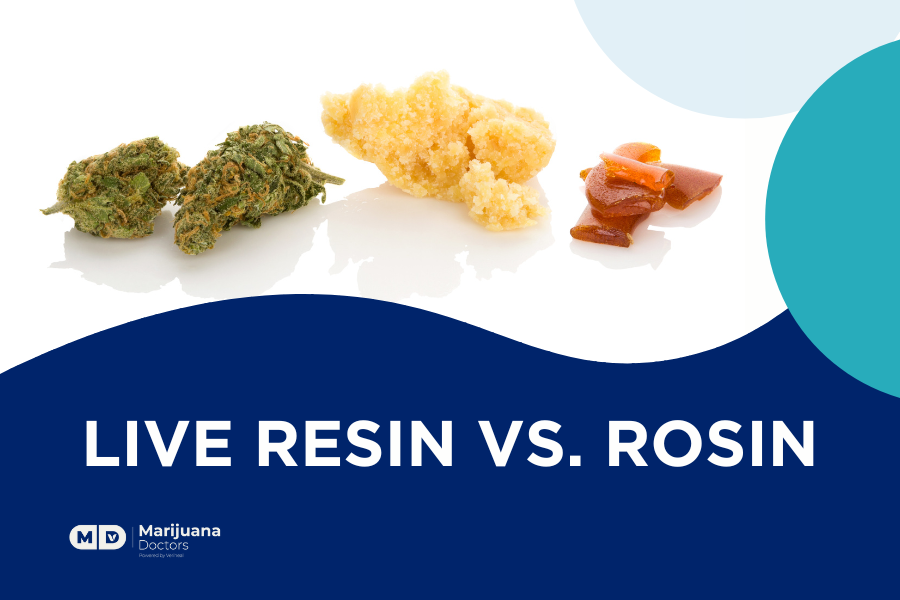
In the world of cannabis, there are many terms for the various products available and the multiple methods of consumption. Concentrates and extracts commonly reference a cannabis product made by extracting concentrated levels of plant compounds into a consumable product most often consumed by vaping or dabbing. Within the realm of cannabis extracts, however, there are also specific terms such as crumble, wax, shatter, rosin, resin, live resin, BHO, and many others. Each of these consistencies and options of cannabis concentrates has its own pros and cons. Let’s take a closer look at live resin vs rosin and evaluate their unique medical advantages.
Before we dive right into live resin vs rosin, you must understand the fundamental aspects of extraction techniques utilized to produce cannabis concentrates. The two primary types of extraction are methods that use solvents and those that do not. Solvents such as butane, CO2, hexane, and others are often employed to strip cannabis plant material of cannabinoid content to make concentrates. Alternately, natural elements such as heat, pressure, ice, and water are utilized in solventless techniques.
You may have heard someone refer to resin in the past in reference to the black tar-like substance that would accumulate inside pipes. However, the resin you hear about patients and consumers embracing in the legal cannabis industry today is something different. Let’s explore the differences between rosin vs resin.
The trichomes on cannabis plants secrete resin, a sticky, often amber-colored substance. This type of cannabis concentrate is commonly extracted from cured cannabis buds utilizing a hydrocarbon solvent-based extraction method in a closed-loop system by trained lab professionals. The result is a potent cannabis concentrate with other plant compounds, such as terpenes, removed during extraction.
So now that you have a basic understanding of what resin is and how it is made, let’s explore rosin. Rosin is a solventless cannabis concentrate that is extracted utilizing heat and pressure to obtain concentrated cannabinoids and other phytocompounds. This process requires no chemicals or expensive lab equipment. There are methods to make rosin with a small amount of cured cannabis, some parchment paper, and a hair straightener. There are also rosin presses on the market that provide precise pressure and heat settings that can be purchased and utilized efficiently with some basic knowledge at home. Rosin is renowned for its flavor profile in comparison to other cannabis extracts. Since this form of concentrate is extracted without the use of chemicals or solvents, it results in a full-spectrum extract that retains the natural terpene and cannabinoid profile of the original plant material.
As noted, the resin and rosin referenced above are made utilizing dried, cured cannabis plant material. This means that the cannabis was harvested, trimmed, and allowed to dry and cure before undergoing extraction. A live concentrate such as live rosin or live resin is made utilizing cannabis plant material that was frozen immediately after harvest, and that remains in a frozen state leading up to and during extraction. Essentially by freezing cannabis immediately after harvest, it retains its natural terpene and cannabinoid profile that may otherwise change naturally through the curing and drying process.
In the case of rosin vs. live rosin, many would agree that live rosin is a superior product simply due to the natural essence of the plant that you receive in the final product. It also tends to have a broader and more concentrated terpene profile. This doesn’t just mean a more flavorful extract but also a broader range of potential therapeutic benefits.
Now that you know more about resins vs rosins, you may be curious about why consumers and medical cannabis patients may choose them over other cannabis extract options and consumption methods available on the market today. From a medical perspective, there are a few reasons why these forms of cannabis concentrates can be beneficial over other forms for cannabis patients. In general, cannabis extracts are embraced due to their high potency and concentration of cannabinoids, primarily THC and/or CBD.
For patients that have a need for high THC, these products offer that in a quick, efficient consumption method that results in almost instantaneous effects. From a medical perspective, this is phenomenal for those who need instant relief from things such as pain, nausea, anxiety, depression, muscle spasms, and much more. So, is there a medical advantage or difference between rosin and resin or cured vs. live extracted concentrates? Let’s explore.
The answer to this question depends on who you ask. From a medical perspective, rosin is a much cleaner extract as it does not utilize chemicals for extraction. It is also a full-spectrum extract, which means that its higher terpene concentration and broader cannabinoid profile could help to support the entourage effect. This theory posits that cannabis compounds such as terpenes and cannabinoids work best and provide the most beneficial effects when working synergistically together in comparison to the effects of isolated compounds such as primarily high THC extracts such as resin. However, many cannabis patients prefer high THC levels, and extracts such as resin have a higher concentration of THC than rosin. However, it is also arguable that the terpenes and other cannabinoids working to produce the entourage effect could be more beneficial than simply a higher THC concentration alone.
Both resin and rosin are excellent cannabis concentrate options available on the market today, each having its own unique benefits from a consumer and patient perspective. From a medical standpoint, rosin is the safer extract of the two. When it comes to live vs. cured, live concentrates such as live rosin have the potential to offer a broader range of therapeutic benefits for medical cannabis patients and would ultimately be the superior option from a medical perspective.
No Information on MarijuanaDoctors.Com should be used to diagnose, treat, prevent or cure any disease or condition. You can view our Full Disclaimer here.